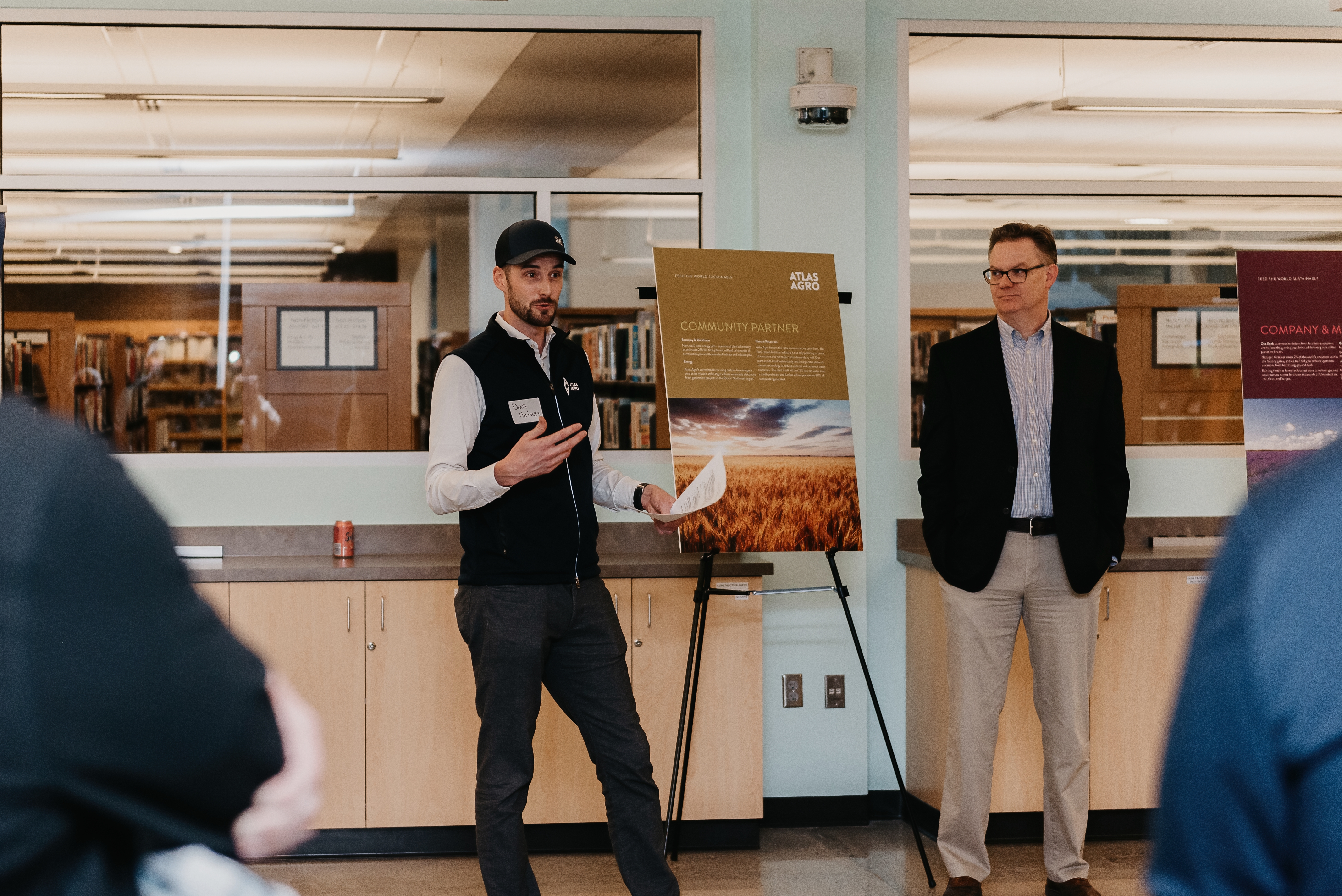
Home » Atlas Agro nears decision point on $1B fertilizer plant
Atlas Agro nears decision point on $1B fertilizer plant

Dan Holmes, Atlas Agro president for North America, left, speaks during a community open house on the Pacific Green Fertilizer project on Feb. 27 in Richland. He's pictured with Karl Dye, president and CEO of the Tri-City Development Council, or TRIDEC.
March 15, 2024
Atlas Agro expects to decide by the end of the year whether to move forward with a $1 billion zero-carbon nitrate fertilizer plant in Richland – a project the Swiss company describes as a pioneering initiative aimed at revolutionizing the fertilizer industry.
The company’s front-end engineering and design study is complete, along with a 3D model of the plant and “early procurement activities,” said Dan Holmes, Atlas Agro president for North America, in a statement. “Our efforts are now focusing on permitting processes, finalizing the selection of the construction company, and (engineering, procurement and construction) contract negotiations,” he said in the statement.
While several external factors could influence the timeline, “we expect (the final investment decision) to take place later this year. We are working hard to ensure the plant is up and running in 2027,” Holmes told the Journal of Business in the statement.
Construction is expected to take 36 months.
The plant, called the Pacific Green Fertilizer Plant, is slated for land in the Northwest Advanced Clean Energy Park in Richland. It’s designed to make 0.7 million tons of nitrate fertilizer a year, primarily supplying the Pacific Northwest, the company said on its website.
The fertilizer – which will be made using air, water, carbon-free electricity and limestone or dolomite as the raw materials – is better for the environment and for farmers, the company said. It’s directly consumed by crops, it doesn’t require nitrification in the soil, and it works in precision farming, leading to better-quality crops with higher yields and less impact on the land, among other benefits, the company said.
The project has generated significant interest in the Tri-Cities since last year, when Atlas Agro signed a purchase and sale agreement with the Port of Benton for the land.

A preliminary rendering of Atlas Agro's design concept for a $1 billion zero-carbon fertilizer plant in Richland. The final design may change as the project is refined and finalized, the company said.
| Atlas AgroPort commissioners recently amended the agreement to provide more time for due diligence and review. The original pact gave Atlas Agro a year to determine if it wanted to move forward with the project at the site.
"We thank our city partners and our development team for their continued efforts toward advancing the Atlas project," said Diahann Howard, port executive director, in a statement. "The Atlas project supports industrial economic development and jobs for our existing workforce, keeping dollars in our community benefiting our local businesses and strengthening our region."
An increased Tri-Cities presence
As the project progresses, Atlas Agro is increasing its presence and outreach in the Tri-Cities. Kaustav Chaudhuri, head of project development for North America, spoke at the Tri-City Development Council’s 25th annual Economic Outlook and Workforce Summit on Feb. 13 in Kennewick, and Holmes and other Atlas Agro officials met with the public and answered questions during an open house on Feb. 27 at the Richland Public Library.
The company also has office space at Fuse in The Parkway in Richland.
Holmes said Atlas Agro is committed to fostering an open and inclusive dialogue.
“We encourage community members to get involved and share their insights with us. Our team is readily accessible via info@atlasagro.ag for any queries or feedback. As a company driven by our mission to serve both farmers and their communities, we are dedicated to ensuring our operations bring value and support to the areas where we operate,” he told the Journal of Business in the statement.
The plant could create up to 235 permanent high-skilled jobs, depending on final design, the company said. It's estimated to support up to 1,000 direct and induced jobs during operations, plus hundreds of jobs during construction, the company said.
The project’s value and job impacts made it eligible for a 10-year property tax exemption through Richland’s Targeted Urban Area program, an economic development tool aimed at enticing manufacturers to build or expand in the city. The Richland City Council signed off on Atlas Agro’s application on March 5 after discussing the project’s economic impact, job creation and power needs. The property tax exemption applies to new improvements – not the land itself – and is estimated to total $19.5 million over 10 years.
In his statement, Holmes said Atlas Agro is grateful for the community’s support.
“The Pacific Green Fertilizer factory, upon completion, will not only secure a stable supply of essential crop nutrients for the Pacific Northwest but also elevate the competitiveness of our region's agricultural products on the global stage,” he said. “We are eager to showcase the viability of sustainable green fertilizer production and are thrilled about the partnership with the Tri-Cities community in this pioneering venture.”
He added that Atlas Agro is "eager to explore additional efficiencies the Pacific Green Fertilizer factory may bring to the region, including those within the broader green hydrogen economy and potential opportunities such as waste heat recovery.”
Latest News Energy Manufacturing
KEYWORDS March 2024
Related Articles





